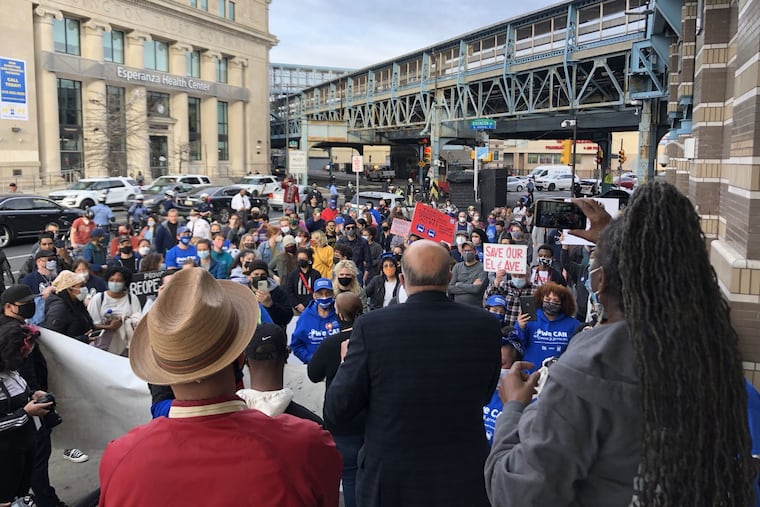SEPTA will reopen troubled Somerset El Station in Kensington on Monday
Transit Police will be assigned to Somerset Station to provide increased security and work with social workers to offer help to people in addiction.

SEPTA plans to reopen the Market-Frankford Line’s Somerset Station on Monday with increased security, two weeks after the Kensington stop was shut for public safety issues, repairs, and deep cleaning amid open drug use and dealing.
“By working around the clock, crews have made tremendous progress with maintenance and repairs,” Leslie Richards, general manager of the transit authority, said in a statement Thursday. She said SEPTA would “work with the city, community groups and other organizations” to help people in addiction and homeless people who have sheltered in increasing numbers at the station.
“These are extremely complex societal issues we are all grappling with,” Mayor Jim Kenney said in a statement. He pledged “meaningful changes along the Kensington Avenue corridor.”
» READ MORE: Shuttered El stop illuminates depths of Philly's entrenched social problems
Emergency maintenance and repair work was needed to deal with damage caused by urination, human waste, discarded needles, and other debris, SEPTA officials said.
Structures, including those supporting stairs and passenger crossovers, were reinforced, and crews installed enhanced lighting. (The structures were safe, but SEPTA wanted to buttress them for extra safety.) The station also got a deep cleaning and new paint. Work on broken elevators, the reason initially cited for the closure, likely will continue as the station returns to service.
All told, the agency estimates the work cost $1 million, when including the ongoing elevator repair.
Transit police officers will be assigned to Somerset Station throughout the day. They will work with social outreach workers based at the station to help people in addiction and people in need of behavioral health treatment, SEPTA said in a statement.
» READ MORE: Inga Saffron: Mayor Kenney’s lack of involvement in Somerset El closure is a failure in leadership
Inspectors have been sent to Allegheny Station, a half-mile to the northeast, to assess repair and maintenance needs there, SEPTA officials said. Neighbors say there is significant drug use and dealing in and around that station as well. Allegheny has a larger footprint than the relatively cramped Somerset does, so it would be able to remain open while work is going on, officials said.
By next week, SEPTA plans to deploy 60 security guards along the Market-Frankford Line to supplement police patrols.
Somerset Station closed March 21 because of the disorder — with open drug use and people squatting inside and at entrances — and elevators wrecked by corrosive urine, needles, and trash. Commuters and SEPTA employees have complained of the drug traffic, harassment, and even violence on trains and in stations in the transit system, centered on the El.
» READ MORE: Kensington protests closing of SEPTA’s Somerset El station, a lifeline for a battered neighborhood
While homeless people and drug users had gathered in Somerset in recent years, the number of people sheltering there increased because of social distancing restrictions in shelters and drop-in centers because of the pandemic. People also have used other SEPTA stations to keep out of the elements.
Neighbors who relied on the station, which has served about 800 people on an average day during the pandemic, were outraged. Some said they had mobility issues and could not easily travel to the nearby Allegheny and Huntingdon stops. SEPTA also has offered free transfers from the El to the Number 3 bus to bridge the gap in service.
A protest march and rally by about 200 Kensington residents and supporters days after the closure focused regionwide attention on the issue, as well as the complex problems of drug use and homelessness in the area — and the city government’s failure to address them.
“This was a significant win for the community,” said Bill McKinney, president of the New Kensington Community Development Corp. “It went from ‘indefinite’ closure, to four or five weeks, to two weeks. The biggest variable was the amount of noise people made.”
He said the changes announced by SEPTA are positive “pieces of the puzzle” but the larger, and harder, issues remain, and require a bigger whole-of-government approach.